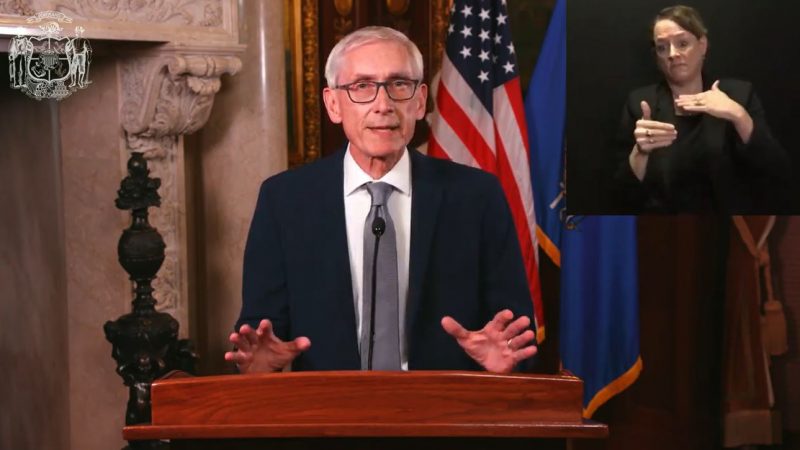Gov. Tony Evers insists his administration did “everything humanly possible” to handle the onslaught of unemployment claims that left thousands of Wisconsinites waiting months for their checks.
In a year-end interview with WisPolitics.com, Evers also hedged on whether he’ll seek reelection in 2022 and said won’t receive a COVID-19 vaccination while frontline healthcare workers are still waiting for it.
Evers said the unemployment backlog was a “horrible situation” and he “feels as badly as anybody else.” But he wasn’t sure if the backlog was unavoidable as claims skyrocketed in the weeks after he issued a stay-at-home order as the COVID-19 pandemic took hold.
Through Dec. 19, nearly 8.8 million weekly unemployment claims had been filed since March 15 with 96.9 percent of them processed, according to the latest DWD update. In late May, 83.6 percent of weekly claims filed at the time had been processed, and Evers forced former DWD Secretary Caleb Frostman to resign in mid-September as the state struggled to resolve the backlog.
>> WisPolitics is now on the State Affairs network. Get custom keyword notifications, bill tracking and all WisPolitics content. Get the app or access via desktop.
In the interview, Evers took aim at Republicans for failing during eight years under Gov. Scott Walker to upgrade the computer system that handles claims. Evers pledged his upcoming budget will include funds to overhaul the technology.
Republicans in turn have slammed Evers over the handling of the backlog, arguing the agency should’ve immediately expanded call center hours and shown more urgency in adding staff to address the backlog.
The Legislative Audit Bureau’s review this month of the unemployment program showed DWD had 175 claims adjudicators in mid-March and didn’t significantly increase those numbers until hitting more than 300 in mid-May. By the end of May, the number of adjudicators hit 500 and peaked at more than 600 by late July.
Assembly Speaker Robin Vos, R-Rochester, said the audit showed an “appalling lack of leadership by the administration.”
Evers predicted the backlog will be resolved by the end of 2020, helped by the collaboration the state signed with Google to help process claims.
DWD considers an issue resolved in a timely manner if it’s completed within 21 days of being detected. As of Dec. 19, there were 22,100 claimants who had been waiting at least that long for their claims to be resolved.
“The fact of the matter is the system should’ve been fixed a long time ago. It wasn’t,” Evers said of the technology used to process claims. “We did everything in our power to staff up quickly. We moved people from state agencies. We hired a call service, all that, at a time when the numbers were going through the roof.”
Evers said his budget also will again propose accepting federal money to expand the Medicaid program. Republicans removed the provision from his first budget, dismissing it as an attempt to expand welfare. The Department of Health Services again put the proposal in its budget request, and removing it would require finding $588 million more in general purpose revenue to fund Medicaid under its current structure.
“The extra revenue would be welcome, but most importantly that extra revenue helps us create a better health care system for people that struggle,” Evers said. “I’m hopeful that people will take a second look at it and say this isn’t welfare as I know some of our colleagues have suggested. This is just good for public health.”
On other issues, Evers said he:
*Will “wait until my number is called” to receive the COVID-19 vaccine. Evers said he understands the interest in having high-profile people publicly receive the vaccine to encourage others to get it once available. But he believes Wisconsin will respond well to being vaccinated “without me taking somebody’s place.”
Evers said he’s not convinced members of Congress getting vaccinated will persuade anyone to get one.
“Personally, I like my approach, and that is I don’t want to take anybody’s place in line. I think that looks bad,” Evers said.
*Supports including teachers and early childhood educators in the next wave of those who will be eligible to receive the vaccine after the first priority included health care workers.
The former state schools superintendent said the “sooner we get kids in the classroom, the better” and the vaccine can aid in that process. Still, he noted districts across the state are already providing in-person instruction.
“Two things are clear,” Evers said. “Virtual learning isn’t for everybody and kids are not the transmitters that we had feared they were going to be. Is it always going to be messy until we get everybody vaccinated? Yes. But I think it’s important that we start to transition in that direction.”
*Declined to say if he would run for another four-year term in 2022.
In last year’s year-end interview with WisPolitics.com, Evers said he was “having fun” as governor and answered “Hell yes” when asked if he could picture himself serving two terms.
This year, Evers said he’s made no decision about running for reelection in 2022, saying he’s focused on the pandemic and getting a budget passed “that reflects the will of the people of Wisconsin.” He said he’ll make a decision after that about another run.
Evers said that doesn’t reflect a change in his thinking, but that he’s not ready to say definitively that he’s running.
“Once you say that, it becomes you’re in campaign mode and I’m not in campaign mode,” Evers said. “I’m trying to get our state out of a pandemic and prepare a budget and prepare for gerrymandering. There’s lots of things on the table besides figuring out whether I’m absolutely going to run.”
Evers added, “I love this job. It’s a great job. It’s a challenge, and every once in a while I get frustrated living in a bubble but so does everybody else in the state so I have good company there.”


